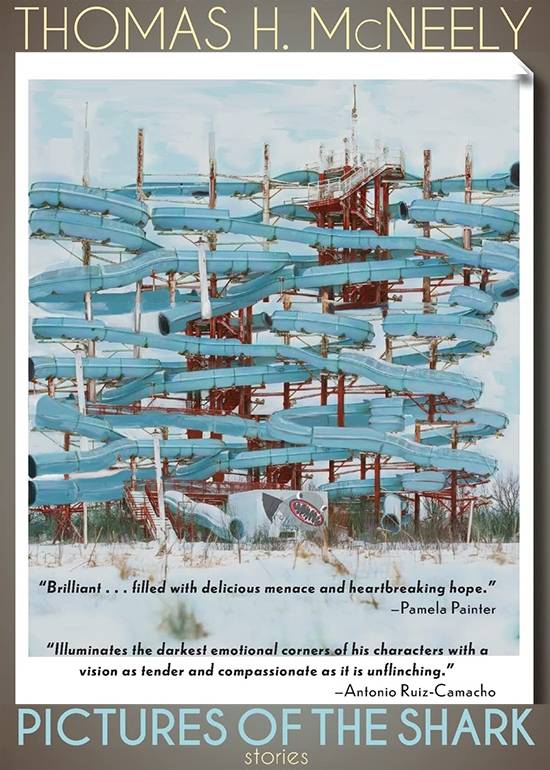You're Going To Need A Bigger Boat

Pictures of the Shark: Stories
by Thomas H. McNeely
Huntsville: Texas Review Press, 2022.
84 pp. $21.95 paperback.
Reviewed by
Cedric Synnestvedt
Thomas H. McNeely’s second book, Pictures of the Shark, contains eight linked stories that (mostly) follow the character Buddy through boyhood and young adulthood. Set in and around Houston, Texas, these stories are rendered in delicate, thoughtful prose reminiscent of Raymond Carver, and each story seethes with quiet dread as the characters confront traumas, past and present. Buddy’s narcissist father, Jimmy, constantly drifts in and out of Buddy's and his mother’s lives. Buddy’s mother, Margot, ensnared by self-loathing, over-mothers him and refuses to let go of her failed marriage. For Buddy, existential rug-pulls abound. He finds that things fall apart, despite grownup pretentions to order. And try as they might, McNeely’s characters cannot escape their failures, but are instead forced to confront themselves in often moving ways.
The book largely avoids the sweeping landscapes one might associate with Texas. We are instead submerged in the characters’ inner lives, which McNeely portrays in exquisite detail. In “Snow, Houston, 1974,” Buddy and his parents are homebound by a rare Texas snowstorm. Most unnerving is the fact that his parents, consumed by their mutual distrust and bickering, are unable to marvel along with their son at what to him is a miracle. Buddy and his mother make a snowman, and the story ends with a gut-punch of a scene in which Buddy, his parents drunk in the kitchen, disfigures the snowman and wanders off into the night:
He remembered crossing a railroad track, and the roaring darkness beneath a pillared freeway, and his heart quailed. Until his mother called to him, he would go as far as he could, though his bootsteps whispered, though he felt himself begin to vanish.
In “Tickle Torture,” one of the most crushing stories in Pictures, Buddy and his mother take a road trip to put some distance between themselves and their troubled life in Houston. Buddy is approaching adolescence, though he still awkwardly lays his head on his mother’s lap and shares hotel beds with her. His mother is aware of her own complicity but is unable or unwilling to admit it. In the hands of a less careful author, a subject like this could easily become melodramatic and cringy. But McNeely writes his characters—the awkwardness of preadolescence, and a mother’s stumbling attempts at connection—in brutally honest detail.
As moving, and engaging as these stories are, they sometimes suffer from excessive narration. At one point in “Tickle Torture,” Buddy reflects on how his mother’s tickling “didn’t feel like it used to.” That it now “felt as if his mother were trying to make him believe he was happy.” Which is fine. The problem for me is that, only a few lines later, we get this: “He knew that most eleven-year-old boys didn’t cry on their mothers’ laps, or sleep with them, or allow themselves to be tickled…” which slows down an otherwise gripping story. Similarly, in “Hester,” the main character Sarah reflects: “If [Buddy] would only get up and show a little tenderness, she thought, it might be better—not perfect, but better.” A few paragraphs later, “They argued, she thought, so that they could make up, when they were drunk. For [Buddy], it was a kind of foreplay, but she hated it.” To me, the latter example achieves what the former only hints at: revealing Buddy’s narcissism and Sarah’s coming to terms with their failing relationship.
By the end, I found myself wishing that the father’s character had evolved more. He is a mostly convincing menace, but the symbolism around him gets repetitive. He is at turns ghostlike, vampiric, a shark. His face is often a “mask” or otherwise obscured. In multiple scenes his huge hands hover above Buddy. In the title story, in which Buddy is obsessed with the animatronic shark from Jaws, and his father is preoccupied with keeping his extramarital romance secret from Buddy’s mother, the plot felt a little…contrived. However, given the emotional weight of the book as a whole, while these issues threatened my attention, they weren’t deal breakers. And in times when our lives are so inundated with media-driven untruths and deception, a brutally honest look at what it means to be a human, to struggle with failure and trauma, is welcomed medicine.
Cedric Synnestvedt lives in Austin, Texas, and teaches writing at Texas State University in San Marcos. His fiction has appeared in PANK, The Sonora Review, BULL, The Jabberwock Review, and Gulf Stream Magazine. He is currently working on a story collection and a novel.
